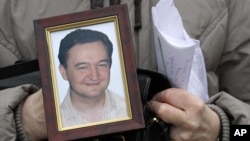LONDON —
Police in southern Britain are investigating the mysterious death of Russian businessman Alexander Perepilichny, who had been providing information to Swiss investigators about alleged fraud by Russian executives and officials.
Perepilichny, 44, was found dead outside his luxury home outside London on November 10, but the case was only reported on Wednesday, when officials said the results of a post-mortem examination were inconclusive.
Perepilichny had fled to Britain three years ago, around the time he provided Swiss prosecutors with documents that activists say prove Russian corruption and money-laundering by Russian criminal gangs. He also reportedly provided information related to the case of Sergei Magnitsky, a Russian lawyer who worked to expose corruption and died in a Russian prison three years ago.
According to Russia's official Human Rights Council, Magnitsky was probably beaten to death.
There have also been several other mysterious deaths of Russians in Britain with possible links to corruption and organized crime.
In 2006, Alexander Litvinenko, a former Russian security service officer who later became a critic of the Kremlin, died in London. British authorities accused two former Russian security service agents of poisoning him with a radioactive substance. Both men deny it, and Russia has refused to extradite them.
No one yet knows whether Perepilichny was murdered, but the ongoing investigation is renewing focus on corrupt practices by Russian officials, which the former British ambassador to Russia, Andrew Wood, said are endemic.
"Because at the top, people don't obey the law, that gives license to everybody else not to obey the law and to grab what they can while they can," Wood said. "That doesn't mean everybody does it. It just means it is inherent in the system."
And the former ambassador said that makes the corruption very difficult to root out.
The director of the Russia Institute at London's King's College, Sam Greene, has a slightly different view. He said many people in Russia are not happy with the situation, and the leaders might like to reduce it, if only to ease public anger. But he said officials' ability to drain cash from the bureaucratic system does serve the leadership's interests by fostering the loyalty of corrupt officials, particularly in distant parts of the country.
"The challenge for the leadership in Russia is to solve corruption in a way that allows the leadership to continue governing the way it wants to govern, which is not necessarily well served by instituting channels of accountability and public oversight," he said.
Cases like the deaths of Perepilichny and Magnitsky create friction with the West, added Greene. That is reflected in anti-Western rhetoric by Russian leaders and a move in the U.S. Congress to freeze the bank accounts of 60 Russian officials believed to have been involved in the Magnitsky case.
Former Ambassador Wood said the corruption and apparently related deaths also fuel tensions between Russia and the West in another way.
"I think there is a link in that a great many Russians, I would think the majority of Russians, are ashamed of it," he said. "They think this is wrong. And therefore, it's only natural for people in those sorts of circumstances actually to look for somebody else to blame."
Wood said that helps make many Russians receptive to the anti-Western rhetoric by their leaders.
Police in the English county of Surrey will conduct a second post-mortem on Perepilichny's body, along with toxicology tests, to try to determine whether he was murdered. If he was, they will turn to the question of why.
Perepilichny, 44, was found dead outside his luxury home outside London on November 10, but the case was only reported on Wednesday, when officials said the results of a post-mortem examination were inconclusive.
Perepilichny had fled to Britain three years ago, around the time he provided Swiss prosecutors with documents that activists say prove Russian corruption and money-laundering by Russian criminal gangs. He also reportedly provided information related to the case of Sergei Magnitsky, a Russian lawyer who worked to expose corruption and died in a Russian prison three years ago.
According to Russia's official Human Rights Council, Magnitsky was probably beaten to death.
There have also been several other mysterious deaths of Russians in Britain with possible links to corruption and organized crime.
In 2006, Alexander Litvinenko, a former Russian security service officer who later became a critic of the Kremlin, died in London. British authorities accused two former Russian security service agents of poisoning him with a radioactive substance. Both men deny it, and Russia has refused to extradite them.
No one yet knows whether Perepilichny was murdered, but the ongoing investigation is renewing focus on corrupt practices by Russian officials, which the former British ambassador to Russia, Andrew Wood, said are endemic.
"Because at the top, people don't obey the law, that gives license to everybody else not to obey the law and to grab what they can while they can," Wood said. "That doesn't mean everybody does it. It just means it is inherent in the system."
And the former ambassador said that makes the corruption very difficult to root out.
The director of the Russia Institute at London's King's College, Sam Greene, has a slightly different view. He said many people in Russia are not happy with the situation, and the leaders might like to reduce it, if only to ease public anger. But he said officials' ability to drain cash from the bureaucratic system does serve the leadership's interests by fostering the loyalty of corrupt officials, particularly in distant parts of the country.
"The challenge for the leadership in Russia is to solve corruption in a way that allows the leadership to continue governing the way it wants to govern, which is not necessarily well served by instituting channels of accountability and public oversight," he said.
Cases like the deaths of Perepilichny and Magnitsky create friction with the West, added Greene. That is reflected in anti-Western rhetoric by Russian leaders and a move in the U.S. Congress to freeze the bank accounts of 60 Russian officials believed to have been involved in the Magnitsky case.
Former Ambassador Wood said the corruption and apparently related deaths also fuel tensions between Russia and the West in another way.
"I think there is a link in that a great many Russians, I would think the majority of Russians, are ashamed of it," he said. "They think this is wrong. And therefore, it's only natural for people in those sorts of circumstances actually to look for somebody else to blame."
Wood said that helps make many Russians receptive to the anti-Western rhetoric by their leaders.
Police in the English county of Surrey will conduct a second post-mortem on Perepilichny's body, along with toxicology tests, to try to determine whether he was murdered. If he was, they will turn to the question of why.






